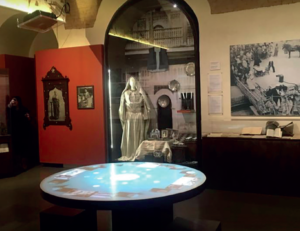Culture – Jews of Libya, a Renovated Room to Narrate Exodus and Rebirth
A renovated room to tell a great and complex story. The inauguration of the new room devoted to Libyan Judaism at the Jewish Museum of Rome ideally closed the twelve months of initiatives organized on the fiftieth anniversary of the forced exodus from the country and the arrival in Italy: conferences, round-table discussions, cultural projects, but also the visit from Prime Minister Paolo Gentiloni at the synagogue, a highly meaningful visit for various reasons.
Inside the synagogue, the Prime Minister said: “The exodus of the Jews from Libya impoverished that country, just like now, and I say that as a Christian, there is a risk of another impoverishment, because in many countries Christian communities might be marginalised or even banished”. He then expressed his appreciation for the “breath of cosmopolitan air” that the Libyan Jews brought with them.
When entering the renovated museum room, the Tripoli seafront is on full display in all its poignant beauty that evokes violently uprooted memories. But liturgical objects, textiles and photographs are exhibited too. Family mementos, that from private cabinets have arrived to public exhibits thanks to the generosity of many contributors. A new essential window of knowledge, unveiled by the President of the Jewish Community Ruth Dureghello, the Assessor for culture Giorgia Calò, the museum Director Alessandra Di Castro and the curator Olga Melasecchi.
Clearly, the memory of the exodus is central to this narrative, but the preceding journey has been recreated too. The many centuries of broken coexistence, from the historical roots. This path was developed in continuity with the direction traced in April 2009, when the then Director of the museum Daniela Di Castro opened the first space devoted to this reality, its features and traditions. It was pointed out that the Libyan presence in Roman community life is today an essential element. During the past half century, this presence has made possible to open new paths and ultimately to revitalise the community itself. Because while at the beginning the integration between Roman and Libyan Jews was limited to some areas only, today the new generations grow up sharing the same environment, schools, free time, customs and traditions, in a constant and successful mutual contamination.
To end the night, Miriam Meghnagi held a concert at the Jewish Community Centre “Il Pitigliani”; the concert was preceded by a promo of the show “Kasher”, with chef Laura Ravaioli, that Gambero Rosso Channel dedicated to Libyan Jews food. Assessor Calò reflected on the many events that marked 2017: “They showed a community that knows how to express its culture and traditions in all its nuances, managing to overcome the tragedy of the forced eviction from the place where they lived, and to integrate in the Jewish communities that accepted them”. The story of Libyan Jews “for certain aspects was unknown, but today it comes to us in its entirety thanks to complete analysis and information”.
This is also the common thread of the conference “Gli ebrei di Libia a Roma” (“Libyan Jews in Rome”), which took place over two days between the Chamber of Deputies and the Roma Tre University. It was an articulate discussion, which highlighted different points of view. The anguish of having to leave it all behind, the challenge of an integration that’s not always easy, the amazing contribution of Rome to Jewish life. Many speakers contributed to this subjects with their own experiences: some through stories, some through photographs, some through videos. During the first meeting, headed by Claudio Procaccia, Director of the Department of Culture of the Jewish Community of Rome, the speakers were Giordana Terracina, Flaminia Del Monte, Gisele Levy and Ucei councillor Victor Magiar. The latter, to report the centuries-old interrupted relationship between Jews and Arab world, used a self-produced video that aims to provide a deeper look at the various open questions. The meetings then continued, under the coordination of the Ucei Board Member for Culture David Meghnagi, with speeches by Miriam Haiun, Claudia Fellus and Ariel Arbib. Haiun, Director of the Culture Centre of the Jewish Community of Rome, talked about the experience of the Bank of Memories, an on-line project that makes it possible to piece together many fragments of Jewish life in Libya. Finally, the protagonists of the third part, headed by Professor Luigi Goglia, were Silvia Haia Antonucci, Fortunee Habib, Olga Melasecchi and Patrizia Pampana.
Translated by Sara Volpe, student at the Advanced School for Interpreters and Translators of Trieste University, intern at the newspaper office of the Union of the Italian Jewish Communities.

